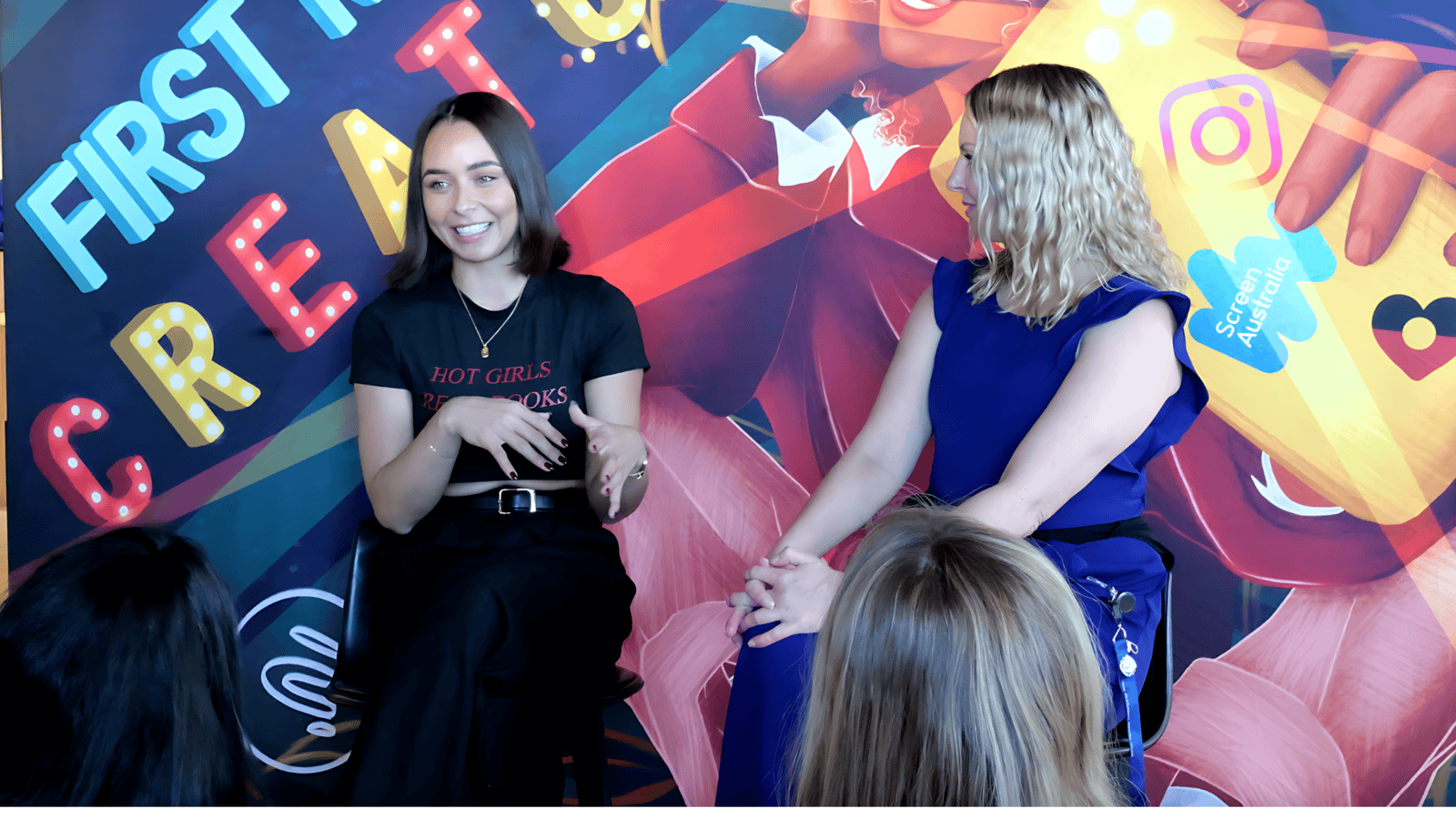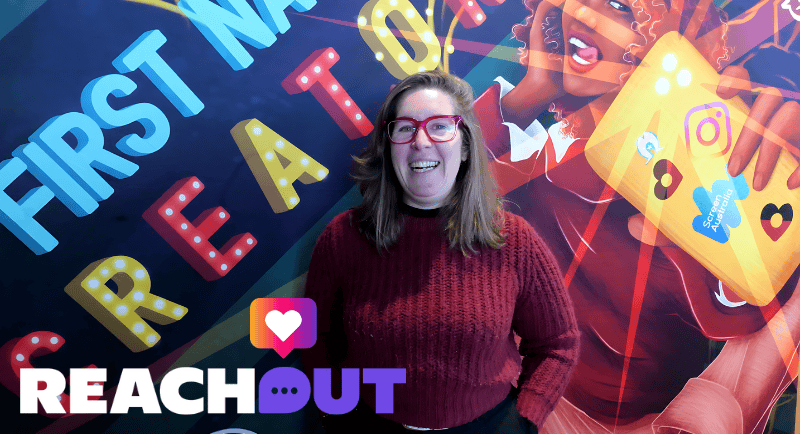“Social and emotional wellbeing is not always linear,” according to Annie Wylie, senior manager of digital content at ReachOut Australia.
Wylie joined a host of speakers on day one of the First Nations Creators Program, held at Sydney’s Meta headquarters, which opened its doors for the first time to the media.
The program, now in its fourth iteration, is driven by Instagram Australia in partnership with Screen Australia’s First Nations Department. The initiative aims to foster Indigenous talent, providing practical and financial resources to support long-term career prospects for First Nations creators in social media and digital content creation.
Other speakers included Australian media personality and youth worker Brooke Blurton, managing director of social-first agency Hello Social Sam Kelly, and founder of digital talent agency Day Management, Genevieve Day.

Brooke Blurton and Meta’s Kirsty Wilson at The First Nation Creators Program
Emotional and social wellbeing for creators
Wylie hosted a discussion on the social and emotional wellbeing of content creators – the complexities of navigating creatorship on social media, and the additional challenges of the “cultural load” that First Nations peoples can carry.
For creators, Wylie underscored the importance of self-reflection on boundaries and what one is willing to share, prioritising self-care, understanding parasocial relationships, and, above all, taking proactive measures to help navigate interactions with online communities and prospective brand partners.
“You’re putting yourself out there, and when you’re putting yourself out there it can really nourish you, but it can also create certain challenges,” says Wylie.
Set limits and ask for help: Wylie’s tips
She shared four tips for creators: set boundaries, find balance, switch off, and ask for support.
When it comes to setting boundaries as a creator, including sharing personal information, Wylie advised, “reflect on what you’re willing to share.
“What’s important for me to share? What’s not one for me to share? What feels comfortable for me to share? And what feels uncomfortable for me to share?
“If you don’t feel comfortable with your business place being a place where you speak about your neurodiversity or your sexuality, or your relationships or your culture, then it’s really important to consider that because people will come to that account and expect that of you.”
She further championed adopting self-reflection on boundaries as a regular application for creators: “You might reflect on this every six months, once a year, or maybe it’s a quarterly thing.”
Wylie not only advocated for setting limits with followers – such as using Meta’s safety features to block comments and DMs with flagged keywords – but also recommended applying these practices with potential brand partners. This is particularly important for First Nations creators, she noted, to avoid tokenistic or culturally insensitive engagements. In both scenarios, Wylie suggested the approach of using pre-prepared responses.
“One of the ways you can make that a little bit easier is pre-prepared responses that say no in a nice way,” she says. “That way you’re not investing your emotional energy into that message.
“Where that can be particularly hard is with working with partners and contracts, where they might be asking you things particularly about culture.”
In such cases, Wylie recommended responses that “set the expectation so that they know what you have to offer.”
When it comes to finding balance, Wylie said, “You probably will want to talk about certain topics sometimes,” referring to the pressures and expectations audiences may have for creators to address difficult issues like mental health or culturally sensitive topics.
To find a balance in handling conversations that can be demanding, she advised to “know in advance what those things are” that creators are willing to engage with.
She also assured creators that “if you’re finding you’re getting bombarded it’s okay to turn stuff off. You can use the Meta apps to set limits on certain things.”
For example, Instagram offers tools like break reminders, mute functions, comment controls, keyword filtering, sensitive content control, ad control, and restrict features.
Finally, Wylie emphasised the importance of asking for support.
“You guys are lucky because you’re all meeting each other in this setting,” Wylie told the room at Meta HQ. “You’ve got this inbuilt group of people experiencing very similar things, so you can lean on each other.”
One of the more complicated phenomena that content creators face is the duty of care they owe to themselves in managing parasocial relationships. As Wylie described, these exist when “people really feel like they’ve got a relationship with you.”
“That’s the beauty of all the work you do, but it can also be really hard.”
In this case, the lessons of boundary setting and preparedness become pertinent.
“Take time to do that reflection regularly so you really know where you’re willing to share what. And it’s okay to not want to share anything. You don’t have to share your culture, you don’t have to share your gender, you don’t have to share your experience. Don’t feel that just because somebody has this parasocial relationship with you that you owe them anything because you don’t.”
“So then, how do you enforce that boundary?” she continued. “It’s practice. It’s practising it, and practising sitting with discomfort.”
Long lasting bonds: Meta on the program
Kirsty Wilson, part of Meta ANZ’s global partnerships team, said the business was “incredibly proud to continue celebrating, elevating and amplifying some of Australia’s most creative and important voices through this program – we have empowered emerging First Nations creatives, equipping them with the tools to flourish on our platforms, and beyond.”
“One of the most powerful parts of the program is the feedback from the creators about how incredible it feels for them to be around other First Nations creators,” she said, “sharing stories, forming community and supporting each other. We’ve heard that today from this group of 10, and the bonds that they form from the program are long lasting.”
–
Top Image: Annie Wylie
